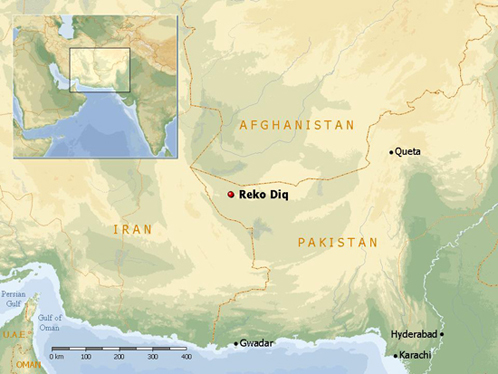A World Bank’s tribunal has awarded almost $6 billion to Tethyan Copper Co. (TCC), a joint venture between Antofagasta PLC (LON:ANTO) and Barrick Gold (TSX:ABX) (NYSE: GOLD) Pakistan, settling this way a seven-year battle over a multi-billion-dollar copper and gold reserve in the country.
The ruling, issued over the weekend, follows a 2017 verdict which confirmed that the South Asian nation violated several provisions of its bilateral investment treaty with Australia, where Tethyan Copper is incorporated, by denying a mining lease for the partners’ Reko Diq project.
The case dates back to 2011, when the provincial government of Balochistan rejected TCC’s application for a mining licence at the remote Reko Diq site, a rocky desert area near the Pakistan border with Iran and Afghanistan, even though the firm had been awarded a licence for exploration in the area in 2006.
World Bank tribunal rules in favour of Tethyan Copper, a joint venture between the Chilean copper miner and Canada’s gold giant after seven-year battle over denial of mining lease for the multi-billion-dollar Reko Diq copper and gold reserve.
Such move came shortly after Chinese competitors pushed an alternate plan for what could have become Pakistan’s biggest mine. As part of that counter proposal, the Metallurgical Corporation of China (MCC) offered the province a larger share in income and royalty.
Pakistan, however, said the
decision had been based on security issues and opposition from local communities.
TCC took the case to the
International Center for Settlement of Investment Disputes (ICSID), the World
Bank’s arbitration body, claiming damages related to the more than $500
million it had spent in exploration and feasibility studies.
The firm had also vowed to
investment $5 billion over five years in what it could have been the biggest
foreign-financed project in Pakistan’s history.
The $5.84 billion award almost
matches the bailout the South Asian nation agreed with the International
Monetary Fund (IMF) in May, in order to avoid a creeping economic crisis.
The combination of both issues,
however, have sparked a national strike. Hundreds of shops across the country were
shut over the weekend as business owners protested against the government’s
plans to boost tax revenue aggressively and cut subsidies to qualify for the help
of the IMF.
Damages, said Barrick, include compensation of $4.09 billion for the fair market value of the project at the time the mining lease was denied, plus interests to the date of the award of $1.75 billion.
The tribunal also awarded the joint venture just under $62 million in costs, the gold giant noted.
Giant copper-gold deposit
Based on the latest estimates available, the $3.3 billion Reko Diq open pit mine project was estimated to yield 200,000 tonnes of copper and 250,000 ounces of gold a year, contained in 600,000 tonnes of concentrate, over its 56-year life.
Such figures indicate the asset was
one of world’s largest undeveloped copper and gold deposits at the time.
“We remain willing to discuss the potential for a negotiated settlement with Pakistan,” TTC’s chairman, William Hayes, said in a separate statement. “We will continue to protect our commercial interests and legal rights until the conclusion of this dispute.”

“Given the size of the award, we
expect the government of Pakistan to appeal by any route possible and to defer
and delay to all and any extent possible,” Edward Sterck, analyst at BMO
Capital Markets, said in a note to investors. “The end amount, form and timing
of any eventual payment is very hard to determine and we do not believe the
market is pricing in anything like the full settlement, and arguably nor should
it.”
Pakistan’s government said it will review the ruling and consider a potential petition to the tribunal.
The country’s military sees Reko Diq as a strategic national asset and had taken a key role in its development amid the dispute with Antofagasta and Barrick, sources familiar with the situation said earlier this year.
